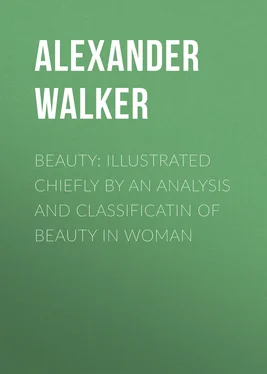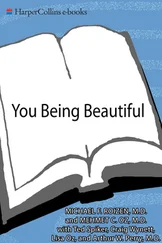Alexander Walker - Beauty - Illustrated Chiefly by an Analysis and Classificatin of Beauty in Woman
Здесь есть возможность читать онлайн «Alexander Walker - Beauty - Illustrated Chiefly by an Analysis and Classificatin of Beauty in Woman» — ознакомительный отрывок электронной книги совершенно бесплатно, а после прочтения отрывка купить полную версию. В некоторых случаях можно слушать аудио, скачать через торрент в формате fb2 и присутствует краткое содержание. Жанр: foreign_antique, foreign_home, psy_sex_and_family, на английском языке. Описание произведения, (предисловие) а так же отзывы посетителей доступны на портале библиотеки ЛибКат.
- Название:Beauty: Illustrated Chiefly by an Analysis and Classificatin of Beauty in Woman
- Автор:
- Жанр:
- Год:неизвестен
- ISBN:нет данных
- Рейтинг книги:5 / 5. Голосов: 1
-
Избранное:Добавить в избранное
- Отзывы:
-
Ваша оценка:
- 100
- 1
- 2
- 3
- 4
- 5
Beauty: Illustrated Chiefly by an Analysis and Classificatin of Beauty in Woman: краткое содержание, описание и аннотация
Предлагаем к чтению аннотацию, описание, краткое содержание или предисловие (зависит от того, что написал сам автор книги «Beauty: Illustrated Chiefly by an Analysis and Classificatin of Beauty in Woman»). Если вы не нашли необходимую информацию о книге — напишите в комментариях, мы постараемся отыскать её.
Beauty: Illustrated Chiefly by an Analysis and Classificatin of Beauty in Woman — читать онлайн ознакомительный отрывок
Ниже представлен текст книги, разбитый по страницам. Система сохранения места последней прочитанной страницы, позволяет с удобством читать онлайн бесплатно книгу «Beauty: Illustrated Chiefly by an Analysis and Classificatin of Beauty in Woman», без необходимости каждый раз заново искать на чём Вы остановились. Поставьте закладку, и сможете в любой момент перейти на страницу, на которой закончили чтение.
Интервал:
Закладка:
Dr. Pritchard similarly observes, that “the perception of beauty is the chief principle in every country which directs men in their marriages.”
Advancing a step farther, Sir Anthony Carlisle thinks a taste for beauty worthy of being cultivated. “Man,” he observes, “dwells with felicity even on ideal female attributes, and in imagination discovers beauties and perfections which solace his wearied hours, far beyond any other resource within the scope of human life. It cannot, then, be unwise to cultivate and refine this natural tendency, and to enhance, if possible, these charms of life. We increase and heighten all our pleasures by awakening and cultivating reflections which do not exist in a state of ignorance. Thus, the botanist perceives elegances in plants and flowers unknown and unfelt by the vulgar, and the landscape-painter revels in natural or imaginary scenery, with feelings which are unknown to the multitude. It would be absurd to pretend that the more exquisite and more deeply attractive beauty of woman is not worthy of more profound, as well as more universal cultivation.”
Such are the observations of philosophical anthropologists, who, nevertheless, in these remarks, consider mere physical beauty independent of its connexion with corresponding functions or moral qualities.
If, however, the external beauty of woman, calculated as it is to flatter the most experienced eye, limited its effect to a local impression, to an optical enjoyment, the sentiment of beauty would be far from having all its extent and value. Happily, ideas of goodness, of suitableness, of sympathy, of progressive perfection, and of mutual happiness, are, by an intimate and inevitable association, connected with the first impression made by the sight of beauty.
The foundation of this feeling is well expressed by Dr. Pritchard, in his observation that “the idea of beauty of person is synonymous with that of health and perfect organization.”
Hence, it has been observed, the great ideal models of beauty please us, not merely because their forms are disposed and combined so as to affect agreeably the organ of sight, but because their exterior appears to correspond to admirable qualities, and to announce an elevation in the condition of humanity. Such do the Greek monuments appear to physiologists and philosophical artists, whose minds pass rapidly from the beauty of forms to that locomotive, vital, or mental excellence which it compels them to suppose.
Goodness and beauty in woman will accordingly be found to bear a strict relation to each other; and the latter will be seen always to be the external sign of the former.
There are, however (slightly to anticipate what must afterward be explained), different kinds, both of beauty and of goodness, which are confounded by vulgar observers; or rather there are beauty and goodness belonging to different systems of which the body is composed, and which ought never to be confounded with each other.
Where, consequently, one of these kinds of beauty and of goodness is wanting, even in a remarkable degree, others may be found; and, as the vulgar do not distinguish, it is this which leads to the gross error that these qualities have no strict relations to their signs.
Want of beauty, then, in any one of the systems of which the body is composed, indicates want of goodness only in that system; but it is not less a truth, and scarcely of less importance, on that account.—I will now illustrate this by brief examples.
There may, in any individual, exist deformity of limbs; and this will assuredly indicate want of goodness in the locomotive system, of that or general motion. There may exist coarseness of skin, or paleness of complexion; and either of these will as certainly indicate want of goodness in the vital system, or that of nutrition. There may exist a malformation of the brain, externally evident; and this no less certainly will indicate want of goodness in the mental system, or that of thought.
It follows that even the different kinds and combinations of beauty, which are the objects of taste to different persons, are founded upon the same general principle of organic superiority. Nay, even the preferences which, in beauty, appear to depend most on fancy, depend in reality on that cause; and the impression which every degree and modification of beauty makes on mankind, has as a fundamental rule only their sentiment, more or less delicate and just, of physical advantage in relation to each individual. Such is the foundation of all our sentiments of admiration and of love.
The existence or non-existence of these advantages, and the power of determining this, or the judgment of beauty, are therefore of transcendent importance to individuals and to families. Such judgment can be attained by analysis and classification alone. Nothing, therefore, can more nearly affect all human interests than that analysis and classification of beauty which are here proposed.
To place beyond a doubt, and to illustrate more minutely, the extraordinary importance of this subject, as regards advantages real to the species, I may anticipate some of the more minute applications of my doctrine.
If, in the locomotive system of the female, much of the delicacy of form, and the ease and grace of her movements, depend upon the more perfect development of the muscles of the pelvis, and its easily adapting itself to great and remarkable changes, how important must be the ability to determine, even by walk or gesture, the existence of this condition!
If, in the vital system, the elasticity and freshness of the skin are the characteristics of health, and their absence warns us that the condition of woman is unfavorable to the plan of nature relatively to the maintenance of the species—or, if the capacity of the pelvis, and the consequent breadth of the haunches, are necessary to all those functions which are most essentially feminine, impregnation, gestation, and parturition, without danger either to parent or to child—of what extreme importance must be the ability to determine this with certainty and ease!
If, in the mental system, the capacity and delicacy of the organs of sense, and the softness and mobility of the nervous system, are necessary to the vivid and varying sensibility of woman—if it is in consequence of this, that woman is enabled to act on man by the continual observation of all that can captivate his imagination or secure his affection, and by the irresistible seduction of her manners—if it is these qualities which enable her to accommodate herself to his taste, to yield, without constraint, even to the caprice of the moment, and to seize the time when observations, made as it were accidentally, may produce the effect which she desires—if it is by these means that she fulfils her first duty, namely, to please him to whom she has united her days, and to attach him to her and to home by rendering both delightful—if all this is the case, of what inexpressible importance must be the ability to determine, in each individual, the possession of the power and the will to produce such effects!
If (descending to still more minute inquiries) external indications as to figure are required as to parts concealed by drapery—if such indications would obviate deception even with regard to those parts of the figure which are more exposed to observation by the closer adaptation of dress—if, even when the face is seen, the deception as to the degree of beauty, is such that a correct estimate of it is perhaps never formed—if indications as to mind may be derived from many external circumstances—if external indications as to the personal habits of women are both numerous and interesting—if such indications even of age and health are sometimes essential—if all this be the case, let the reader say what other object of human inquiry exceeds this in importance.
Читать дальшеИнтервал:
Закладка:
Похожие книги на «Beauty: Illustrated Chiefly by an Analysis and Classificatin of Beauty in Woman»
Представляем Вашему вниманию похожие книги на «Beauty: Illustrated Chiefly by an Analysis and Classificatin of Beauty in Woman» списком для выбора. Мы отобрали схожую по названию и смыслу литературу в надежде предоставить читателям больше вариантов отыскать новые, интересные, ещё непрочитанные произведения.
Обсуждение, отзывы о книге «Beauty: Illustrated Chiefly by an Analysis and Classificatin of Beauty in Woman» и просто собственные мнения читателей. Оставьте ваши комментарии, напишите, что Вы думаете о произведении, его смысле или главных героях. Укажите что конкретно понравилось, а что нет, и почему Вы так считаете.












